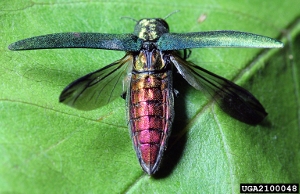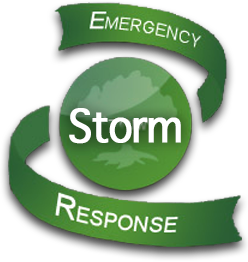 The Emerald Ash Borer continues to wreak havoc in our area. Recently, talks given at the annual Heartland Green Industry Expo (HGIE) centered around this small, metallic green beetle. Attendees included members of GCSAA (Golf Course Superintendence Association of America) and MAGIC Council Members (Mid America Green Industry Council) of which Brandon Hendrickson of KC Arborist, is a board member and incoming secretary.
The Emerald Ash Borer continues to wreak havoc in our area. Recently, talks given at the annual Heartland Green Industry Expo (HGIE) centered around this small, metallic green beetle. Attendees included members of GCSAA (Golf Course Superintendence Association of America) and MAGIC Council Members (Mid America Green Industry Council) of which Brandon Hendrickson of KC Arborist, is a board member and incoming secretary.
EAB Experts Share Critical Information
Because this tree-killing pest has descended from Canada through the northeastern part of our country, our neighbors above us are able to give us helpful information regarding identification and treatment. Dr. Deb McCullough, Michigan State University spoke about the history and experiences that other cities across the US have had with EAB infestation, giving useful advice on how to handle the destruction caused by EAB. Other local experts came to share their knowledge in an effort to eradicate this intruder originally from eastern Asia. Local experts on the panel included: Matt Evans â Ryan Lawn & Tree, Bret Cleveland â Urban Tree Specialist, and Jeff Sifrit â KC Arborist
Updated Timeline of EAB found in the KC Metro Area:
This panel discussed where in the KC Metro EAB has been found (both in traps and in trees), as well as the forecast for EAB infestation in the area. Preventative treatment methods and proper disposal of infested wood were also explained.
2012 Platte County
2012 Wyandotte County
July 2013 Johnson County
July 2013 Jackson County
June 2014 Roeland Park, KS
July 2014 Overland Park, KS
September 2014 Shawnee Mission Park
What to Do if You Have Ash Trees?
Sadly, if untreated, your ash trees will die. The initial damage occurs in the very top of the canopy where the EAB lays its eggs. The larvae feed on the leaves at the top so it can go unnoticed until dying leaves and branches tell you there is a problem. The only way to protect them is to have them treated by a tree care professional. If you have ash trees, (read more about ash tree identification) have them treated as soon as possible. Treatment must occur when the trees have leaves on them and the tree is taking up nutrients. If you have ash trees you want to save, give us a call at KC Arborist and we can give you all the details. Call (913) 390-0033 or (816) 965-0539 with any questions.









